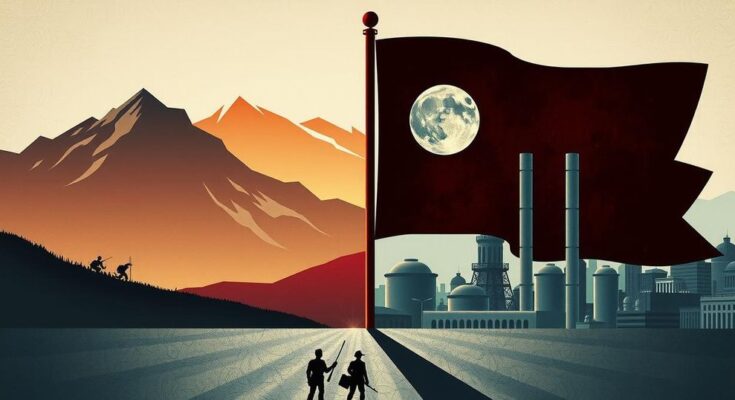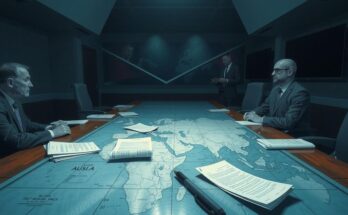Protests in DR Congo intensify against Rwandan President Kagame as M23 rebels capture Goma amid accusations of Rwandan military support. The UN confirms Rwandan troops’ involvement, further escalating tensions. The conflict is rooted in historical ethnic disputes and the aftermath of the 1994 genocide, complicating peace efforts.
In the Democratic Republic of Congo (DRC), public outrage has erupted against Rwandan President Paul Kagame, particularly in Kinshasa. Protesters express their anger by burning his portrait and tearing up Rwandan flags as the M23 rebels seize control of Goma, a crucial city in North Kivu province. The United Nations (UN) has accused Rwanda of supporting these rebels, claiming that they are essentially under Rwandan military command.
Goma, strategically located near the Rwandan border and rich in minerals, serves as a vital economic and humanitarian center. Currently, the city is witnessing intense violence as the M23 rebels have gained control over it, exacerbated by ongoing assaults that have led to numerous casualties. Communication and basic services have collapsed, complicating the situation for the beleaguered populace.
Jean-Pierre Lacroix, UN peacekeeping chief, confirmed the presence of Rwandan troops in Goma aiding the M23, although the exact number of these troops remains uncertain. Some soldiers from the Congolese army surrendered by fleeing across the border into Rwanda, indicating the gravity of the situation. Despite Kagame’s long-standing denial of any support for M23, evidence continues to mount against Rwanda’s involvement.
Richard Moncrief from the International Crisis Group asserts that Rwanda’s justification for its actions has shifted due to growing proof of its support for the rebels, echoing sentiments from the international community. Rwanda’s foreign ministry, however, claims that the conflict near their border poses a significant threat to national security, insisting on the need for a defensive posture in response.
President Kagame links the current situation to historical events, specifically the Rwandan genocide of 1994, wherein remnants of ethnic Hutu militias, involved in the genocide, migrated to the DRC and continue to pose threats. He previously condemned Congolese President Félix Tshisekedi for not addressing the Hutu faction, the FDLR, which Rwanda perceives as a continuous risk.
Commentators argue that the M23’s actions in Goma appear politically motivated rather than strategic, given that they already control economically valuable territories. These actions reinforce Kagame’s influence over North Kivu and respond to perceived failings in governance by Tshisekedi. Rwanda’s government previously accused the late military governor of North Kivu of collaborating with the FDLR, further intensifying conflict dynamics.
The M23 represents the latest manifestation of a rebel group advocating for the Tutsi minority’s interests in eastern DRC. Having disarmed and entered camps after a peace deal years ago, they re-emerged in 2021, citing broken agreements as the reason for their resurgence. The inability of joint regional military efforts to counter M23 has escalated their sophistication and operational capabilities in the region.
UN experts documented extensive training for M23 members, allegedly provided by Rwandan officers, and noted that enlisting minors remains a contentious point of disagreement. Reports indicate a staggering increase in M23’s strength and organization, supported by significant military resources not available to other armed groups in eastern DRC.
Despite Kagame’s dismissal of UN findings, the evidence of Rwanda’s tactical support for M23 rebels persists, supported by various reports detailing engagement tactics and advanced weaponry. The East African Community’s mediation efforts have yet to yield productive dialogues, as Kagame emphasizes the FDLR issue as paramount in any discourse regarding regional security.
The ongoing conflict in the DRC is primarily fueled by historical ethnic tensions and the legacy of the Rwandan genocide. Following the genocide, many Hutu militants fled to the DRC, complicating the security landscape as they formed or joined various armed groups, including the FDLR. The M23 group, claiming to represent Tutsi interests, has engaged in multiple conflicts with the government and various factions in eastern DRC, reflecting the region’s volatility. Rwanda’s involvement has been a matter of international scrutiny, considering its alleged support for rebel factions in DRC, which further destabilizes the area and complicates peacekeeping efforts.
The situation in Goma highlights the deep-rooted complexities and interconnections between local conflicts and regional power dynamics, particularly involving Rwanda and its military operations within the DRC. The protests against Kagame emphasize the rising tensions and accusations levied against Rwanda regarding support for the M23. As violence persists and international scrutiny increases, a collaborative approach among regional powers remains critical for establishing lasting peace and stability in the region.
Original Source: www.bbc.co.uk




